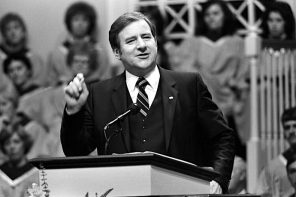Politico reports today that $140 million in stimulus money went to faith-based groups:
[A]n analysis by POLITICO found that at least $140 million in stimulus money has gone to faith-based groups, the result of an unpublicized White House decision to spend government money, where legal, supporting religiously inspired nonprofit groups. And that decision was just the beginning.In an aggressive attempt at outreach, federal agencies, in conference calls and online seminars, instructed faith-based groups on how to apply for the grants, and federal officials sometimes stepped in when the state officials who distribute the money were reluctant to spend it on groups associated with churches and other religious establishments.
I wouldn’t say that this effort was unpublicized, at least for reporters who covered Obama’s Office of Faith-Based and Neighborhood Partnerships from the beginning. The Office’s director, Joshua DuBois, spoke frequently of working on economic recovery issues with faith-based groups. And all the conference calls during which agencies with faith-based offices helped faith-based groups navigate the grant process were hardly kept secret. Yet — explaining the tenor of the Politico piece — DuBois consistently downplayed the financial component, saying his office wasn’t in the business of doling out money (even though the agency faith-based offices are) but emphasized partnerships that would bring the benefits of economic recovery to people through faith-based social services.
But now that the economic recovery is, well, not happening, $140 million to do stuff like replace a church HVAC system looks mighty odd. Or $50 million to Catholic Charities, which does things like pull its adoption services out of D.C. after gay marriage was legalized — especially when you consider that a Catholic Charities representative served on Obama’s Advisory Council to the OFBNP.
At the time Obama put the Advisory Council together, critics charged that doling out money to organizations whose representatives served on it would not only be bad optics, but ethically questionable. The White House either dismissed or ignored these concerns. The activities of the OFBNP, and the Advisory Council, it’s true, didn’t get much press attention. But that was largely because Obama very rarely discussed them, leaving all the activities and rhetoric to subordinates.
Under some fairly consistent pressure from church-state separate advocates, Obama did recently, and after a substantial delay, issue an executive order making some improvements to the constitutional issues that remained from the Bush-era faith-based office and that Obama had promised to correct. One major problem hasn’t been fixed, though: faith-based groups receiving government grants can still discriminate against employees and applicants on religious grounds. That $50 million of taxpayer money to Catholic Charities, for example, would not prohibit the group from refusing to hire someone because they are gay. Many more tens of millions went to other religious groups.
As the Politico piece suggests, all this makes the Obama effort look very much like the Bush faith-based initiative: highly politicized, not particularly effective, not transparent, and hindered by constitutional problems. DuBois even used the very same rhetoric Bush faith-based office proponents used: that government agency assistance to faith-based groups in applying for grant money was necessary to “level the playing field:”
“Part of our job is to ensure that there’s a level playing field — we don’t encourage anyone to favor faith-based groups over other organizations, but we do want to ensure that there’s no discrimination against faith-based organizations,” said Joshua DuBois, who heads the White House Office of Faith-Based and Neighborhood Partnerships, which Bush created and President Barack Obama renamed and expanded.




